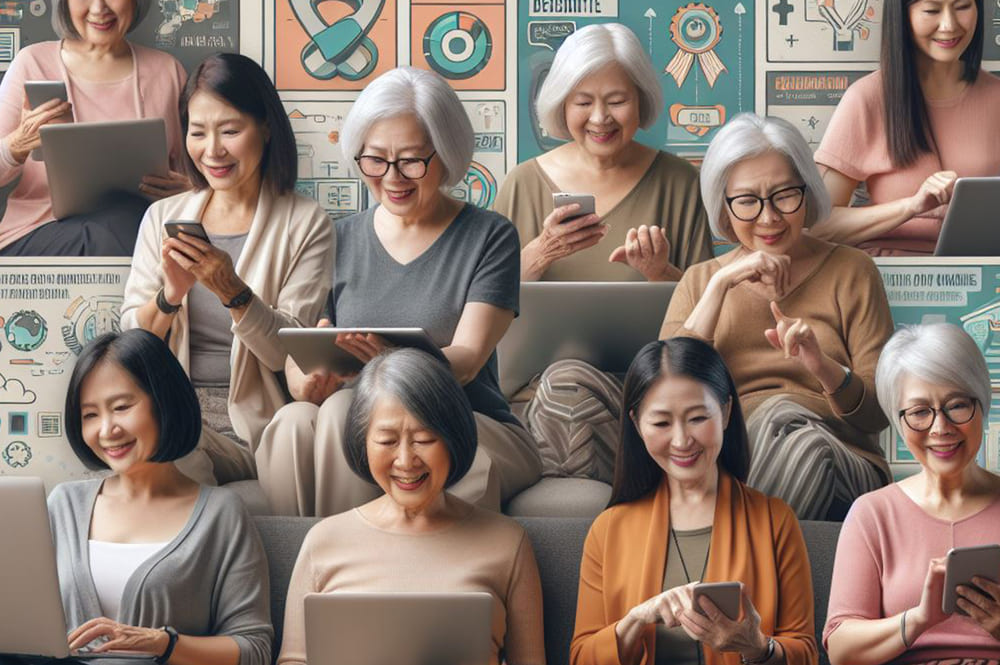Introduction and background
There has been an increasing discussion on the improvement of digital literacy of older individuals in recent years, in part because of the COVID-19 pandemic, when digital technologies have become indispensable for daily life. Digital literacy was recently promoted as the key theme for the International Day of Older Persons (1st October) in 2021.1 Governmental agencies and civil society organizations in Thailand have placed high importance on enhancing digital literacy and skills for the senior population as an integral part of their policies and initiatives.2
As a result of such promotions of digital literacy amongst the elderly, there is a growing prevalence of representations and discussions regarding their use of technology across various media outlets. These platforms often perpetuate ageist views, labeling older individuals as ‘digitally incompetent’ due to their perceived lower willingness and capability to learn as they are less familiar with digital technologies than younger age cohorts. Older women, in particular, are frequently subjected to such representations and societal perceptions influenced by the historical exclusion of females from science and technology.3
This article sheds light on the representations and discussions surrounding the online technology usage of older women, as portrayed in popular mainstream media in Thailand. It shares some key findings from the author’s PhD research, highlighting how digital literacy has been promoted as a crucial part of a ‘good aging’ life for older female individuals in recent years. It maintains that although encouraging the acquisition of digital skills among the older female demographic is beneficial for their well-being, the approaches of the media and cultural domains that attempt to achieve so often reproduce negative stereotypes of older women regarding their use of technologies. Moreover, these approaches may inadvertently increase pressure on older individuals to keep pace with the latest technologies regardless of their access to digital tools or the absence thereof. Finally, it illustrates the consequences of such representations and proposes further recommendations.

Digital Competency: An Uncommon Trait of Older Women
Digital literacy is frequently seen as an attribute uncommon for women within the older age demographic. They are often portrayed and perceived as particularly vulnerable to fake news, fraud, and cybercrimes, which can pose significant threats to their well-being, including disseminating false information on COVID-19 vaccination in various Thai media outlets.4 These representations primarily aim to mitigate online threats and encourage older individuals to improve their digital literacy as an indispensable life skill.
In some rare instances, older women are depicted as ‘technologically savvy.’ Such representations are apparent in one of the television shows on the Thai TPBS channel, Lui Mai Roo Roi (ลุยไม่รู้โรย), which showcases the skills and abilities of older individuals to promote a sense of self-worth and create inspiration for the senior population, as well as enhance social participation of people of all age groups.5 To meet such objectives, some of the show’s episodes challenge the common perceptions around older people’s lack of digital skills by representing its senior female subjects as online content creators, influencers, entrepreneurs, and those who can work remotely with online tools during the COVID-19 pandemic. However, digital competency is still highlighted here as an ‘uncommon’ trait as described by the background narrations, for instance. Some of these older females have been referred to as ‘modern agers’ with a greater willingness to learn new things, who are exceptional or different from their peers in the same age groups. While these representations and narratives can be ‘positive’ on the one hand, they can also accentuate and reproduce stereotypes that most older women are ‘normally’ not as digitally literate as those in the younger demographic on the other.

Older Women as Learners of Digital Technologies
Statistics from the National Institute of Development Administration (2020) indicate that only 30% of Thailand’s population aged 60 or older reported the ability to use digital technology independently in 2020.6 Such statistics underscore a prevailing narrative where older women are portrayed more commonly as acquiring digital skills from younger family members rather than those who can effectively use such technologies independently. Examples of such narratives can be found in lifestyle shows, such as Kasien Samran, an online marketing influencer YouTube channel featuring four celebrities and their mothers.7 In many of its episodes, the celebrities’ mothers are shown learning to use online platforms and mobile applications to connect and catch up with the modern world and shop for essential household products amidst the COVID-19 lockdown restrictions.
Additionally, images of older and younger adults using technologies together may connote the reduced generational gap and enhanced familial relations in Thai society. Nevertheless, it is still crucial to note that such representations and narratives significantly emphasize the lack of older women’s agency and power to use digital technologies without the support of others. They are also reproducing and reducing the gendered roles of older women as solely being the ‘nurturers or mothers in the family who are learning about technologies only through their relationships with younger family members.

Why is it essential to discuss the representations of older women’s (lack of) digital literacy in the media?
Addressing the potential psychological impact of perpetuating narratives about the [lack of] digital literacy among older women in the media is crucial. One notable consequence involves older women’s internalizing stereotypes, leading to diminished confidence in using technology.8 Some may fall prey to a ‘self-fulfilling prophecy’, shaping their behaviour and self-perception as ‘less digitally literate’ based on societal expectations.9
It is, therefore, essential to advocate for creating a more diverse range of representations and narratives relating to older women’s use of online technologies and their digital literacy to counter the perpetuation of the stereotypes mentioned above. One practical approach is to boost the participation and visibility of older women as digital content creators and those who can also teach and share their knowledge and skills in using online technologies with others. Through this, they would have more significant opportunities to share their stories and empower themselves on various media platforms, which currently predominantly target a younger demographic.
Moreover, the media often positions the learning and development of digital literacy as an individual responsibility for older women and their family members, echoing neoliberal rhetoric that highlights self-reliance and independence amidst limited social welfare and public resources.10 This narrative, alongside the ‘stereotypical representations’ of older women as being less ‘digitally competent’ may, to some extent, exert pressure on them to catch up with new trends, earn income on online platforms, and adapt to an increasingly digital world, particularly for those lacking sufficient socioeconomic resources and access to such platforms.
Varying socioeconomic conditions and competencies within various groups of elderly individuals can influence their access to digital technologies. Therefore, narratives in the media promoting digital literacy should inform audiences from various socioeconomic and cultural backgrounds of the resources and options available for them to access and learn about online technologies in their capacities. By promoting a more diverse representation and narratives around their engagements with digital technologies, older women and the broader senior population could potentially experience increased empowerment and reduced marginalization within the digital and technological landscapes.
By: Kullanit Nitiwarangkul (กุลนิษฐ์ นิติวรางกูร)
Published date: 17 January 2024
References
- Sofiat, A. (2021, October 1). How can we ensure digital inclusion for older adults? The World Economic Forum. https://www.weforum.org/agenda/2021/10/how-can-we-ensure-digital-inclusion-for-older-adults/
- Jones, C., and Pimdee, P. (2017), ‘Innovative ideas: Thailand 4.0 and the fourth industrial revolution’, Asian International Journal of Social Sciences, 17(1), pp.4-35
- Cyr, E. N., Bergsieker, H. B., Dennehy, T. C., & Schmader, T. (2021). Mapping social exclusion in STEM to men’s implicit bias and women’s career costs. Proceedings of the National Academy of Sciences, 118(40), e2026308118
- Department of Older Persons. (2022, June 23). ผู้สูงวัยรู้เท่าทัน Fake News (ข่าวปลอม) (สลก.). https://www.dop.go.th/th/know/13/1568
- Thai PBS. (2023). Lui Mai Roo Roi. https://www.thaipbs.or.th/program/Lui/season4
- National Institute of Development Administration (NIDA) (2020), ‘ผู้สูงวัยไทยใส่ใจสังคมมากน้อยแค่ไหน’, NIDA Poll, Available at: https://nidapoll.nida.ac.th/data/survey/uploads/FILE-1597201473365.pdf
- Happy Retire. (2023). Happy Retire Channel. https://www.youtube.com/@HappyRetire
- Lin, C. I., Tang, W. H., and Kuo, F. Y. (2012), ‘Mommy Wants to Learn the Computer” How Middle-Aged and Elderly Women in Taiwan Learn ICT Through Social Support’, Adult Education Quarterly, 62(1), pp.73-90
- Barrie, H., La Rose, T., Detlor, B., Julien, H., and Serenko, A. (2021). “Because I’m old”: The role of ageism in older adults’ experiences of digital literacy training in public libraries. Journal of Technology in human ServiceS, 39(4), 379-404
- Chandler D. (2016), ‘Development as Adaptation’, in D. Chandler and J. Reid (eds), The Neoliberal Subject: Resilience, Adaptation and Vulnerability, London; New York: Rowman and Littlefield International, Ltd., pp.75-98
